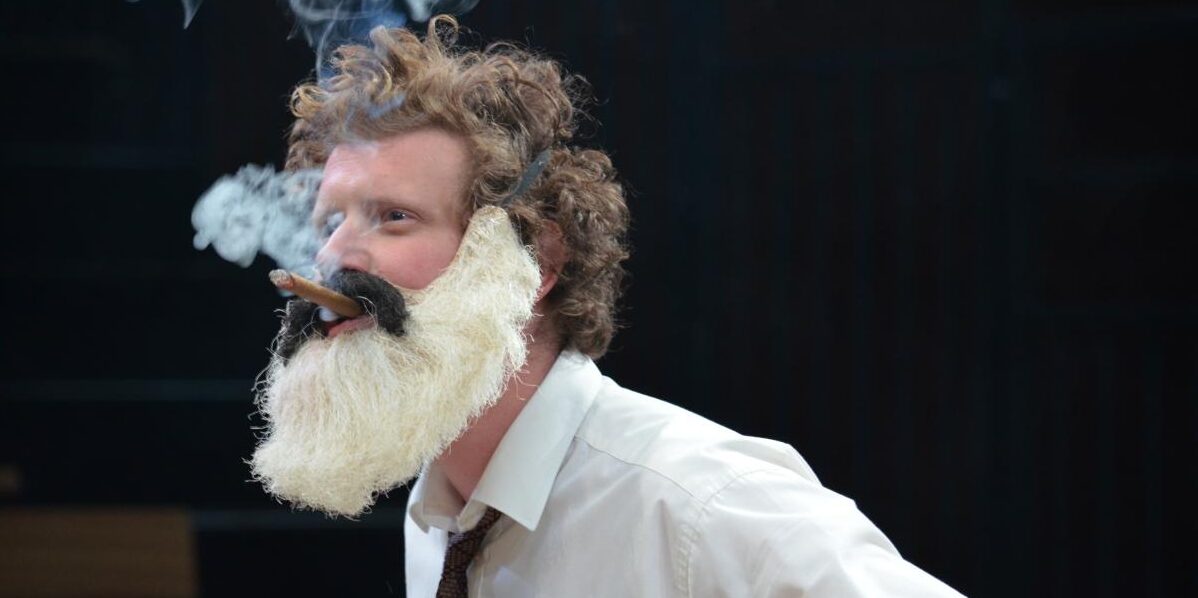Set in 1848, a time when France is on the brink of its third revolution after the upheavals of 1789 and 1830, Banquet Capital invites us to witness a fictitious town hall meeting focused on political issues. This is not only a moment of political revolution but also of the Industrial Revolution, which brings new concerns into the political arena. The audience is invited to participate in this highly charged “banquet” set in a political club, where historical figures like Auguste Blanqui, Charles Baudelaire, François-Vincent Raspail, Armand Barbès, and a factory worker named Albert come to life.
The stage design mirrors the banquet’s horizontal format, with the two-sided stage flanked by bleachers, surrounding a long wooden table that stretches the length of the space. Immersion is key to Sylvain Creuzevault’s production, as the audience is plunged into the significant historical moment of the 1848 revolution and the birth of the Second Republic. Political theatre, by nature, encourages us to reflect on our present, and Banquet Capital certainly attempts to do so.
The play is a reimagined version of Le Capital et son Singe (2014), revamped in 2018 under its current title. Its value lies in the way it draws parallels between the historical events of the 19th century and contemporary French politics. Themes of the play include the eventual betrayal by moderate MPs, the legitimacy and representativeness of politicians, tax rates sustainable for society, and the necessity of state intervention in the economy. These moments are some of the most stimulating, even though the play avoids becoming a straightforward history lesson.
Though directed by Sylvain Creuzevault, the production is labeled as a “collective creation,” with improvisation playing a central role in the development of the piece. This collaborative process contributes to the play’s varied and often disjointed form. For example, the audience might find themselves engrossed in a detailed, fifteen-minute lecture on price, value, and working time, only for it to be interrupted by a political trial that morphs into a farcical comedy, complete with slapstick gags that leave the audience in stitches.
This mixture of anarchic entertainment keeps the 90-minute production rich and chaotic, with precise and inventive performances from the cast. However, the overall experience for the audience is somewhat mixed. The structure of the performance can feel disjointed, and some scenes lack clarity. By the second half, when the focus shifts to the trial of the revolutionaries, the tone becomes overly comedic, even clownish, which risks undermining the revolutionary energy built up in the first half of the play. While the production promises intellectual engagement and experimentation, it often feels trapped within its own aesthetic, unable to fully break free.
French summary
La France entreprend sa troisième révolution, après celle de 1789 et de 1830. Dans ce tumulte postrévolutionnaire, Banquet Capital propose de vivre une assemblée générale fictive autour de questions politiques et sociales. Sous la forme horizontale du banquet, Sylvain Creuzevault et sa troupe nous plongent dans une immersion historique libre, joyeuse et composite, avec la promesse de nous faire réfléchir sur notre présent. Entre exposés didactiques sur la valeur d’usage d’un produit et farce de procès politique, la pièce propose une forme de divertissement anarchiste, riche et tumultueux, porté par ses interprètes. Qu’en reste-t-il à la fin ? Le glissement vers un registre presque entièrement comique voire clownesque efface l’énergie révolutionnaire développée dans la première partie du banquet. L’expérimentation entreprise, qui était la promesse d’un bouillonnement intellectuel qui déborde le plateau, se retrouve enfermée dans sa propre esthétique.
MC93 · Maison de la Culture de Seine-Saint-Denis Bobigny
Until October 6th 2024
Duration 1h and 30 minutes
Based on Le Capital from Karl Marx
Directed by Sylvain Creuzevault
Producer Le Singe
Starring Vincent Arot, Benoit Carré, Antoine Cegarra, Noémie Develay-Ressiguier, Pierre
Devérines, Vladislav Galard, Arthur Igual, Julie Lesgages, Léo-Antonin Lutinier, Frédéric
Noaille, Amandine Pudlo, Sylvain Sounier, Julien Villa

